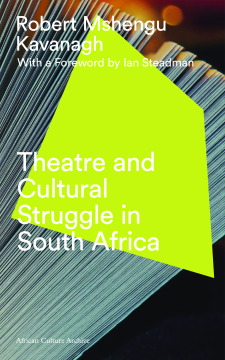
Additional Information
Book Details
Abstract
In this book, South African performer and activist Robert Mshengu Kavanagh reveals the complex and conflicting interplay of class, nation and race in South African theatre under Apartheid. Evoking an era when theatre itself became a political battleground, Kavanagh displays how the struggle against Apartheid was played out on the stage as well as on the streets.
Kavanagh's account spans three very different areas of South African theatre, with the author considering the merits and limitations of the multi-racial theatre projects created by white liberals; the popular commercial musicals staged for black audiences by emergent black entrepreneurs; and the efforts of the Black Consciousness Movement to forge a distinctly African form of revolutionary theatre in the 1970s.
The result is a highly readable, pioneering study of the theatre at a time of unprecedented upheaval, diversity and innovation, with Kavanagh's cogent analysis demonstrating the subtle ways in which culture and the arts can become an effective means of challenging oppression.
Robert Mshengu Kavanagh played an active part in the development of South African theatre in the 1970s through his participation in Experimental Theatre Workshop ’71 in Johannesburg, and as founding editor of S’ketsh’, a magazine covering black and non-segregated theatre in South Africa. After leaving the country in 1976, he did his doctorate at Leeds University and then played a leading role in founding theatre arts departments at Addis Ababa University and the University of Zimbabwe. In 2012 he was awarded the Ibsen Prize for a project on negotiating Ibsen in Southern Africa. He has lived in Zimbabwe since 1984.
Ian Steadman, former professor and Chair of Dramatic Art at the University of the Witwatersrand, author of numerous essays on South African theatre during the 1980s and 1990s, and founding co-editor of the South African Theatre Journal, is retired and lives in Oxford, UK.
'Ground-breaking ... arguably the single most important study of South African theatre.'
Ian Steadman, from the Foreword
Table of Contents
| Section Title | Page | Action | Price |
|---|---|---|---|
| Cover | Cover | ||
| About the Author | iii | ||
| Title Page | v | ||
| Copyright | vi | ||
| Dedication | vii | ||
| Contents | ix | ||
| Map | xi | ||
| List of Abbreviations | xii | ||
| Foreword by Ian Steadman | xiii | ||
| Preface | xvii | ||
| Introduction | xxiii | ||
| 1. Culture and Social Relations in South Africa before 1976 | 1 | ||
| 'Objective Facts not Abstract Definitions' | 1 | ||
| Racial Segregation, Economic Exploitation and Political Oppression | 2 | ||
| Race, Class and Nationality | 5 | ||
| Class Formation and the Occupational Structure | 10 | ||
| 2. The Struggle for Social Hegemony | 13 | ||
| 'Rule' and 'Hegemony' | 15 | ||
| Social Hegemony in the Early Years of Nationalist Rule | 17 | ||
| Social Hegemony Post-Sharpeville | 21 | ||
| Social Hegemony in the Period Leading up to June 1976 | 25 | ||
| 3. Alternative Hegemony in the Making | 31 | ||
| Factors Inhibiting the Development of Class-Based Cultural Differentiation | 33 | ||
| Factors Making for Class-Based Cultural Differentiation | 34 | ||
| The Intellectuals | 35 | ||
| The Intermediate Classes | 37 | ||
| The Proletariat | 38 | ||
| Language | 40 | ||
| 4. The Development of Theatre in South Africa up to 1976 | 43 | ||
| Traditional Drama | 43 | ||
| Drama before 1950 | 45 | ||
| Drama before the Entertainment Segregation Laws | 48 | ||
| Theatre before 'Soweto'\r | 51 | ||
| 5. 'No-Man's Land' — Fugard, and the Black Intellectuals\r | 59 | ||
| 'Bohemia' - Black and White Intellectuals in the Late 1950s | 59 | ||
| No-Good Friday | 64 | ||
| 6. 'A Tremendously Exciting Inter-Racial Enterprise' | 84 | ||
| The Union of Southern African Artists | 84 | ||
| The King Kong Production Team | 92 | ||
| King Kong — The Play | 97 | ||
| 7. 'A Deep Insight into the Loves and Hates of Our People' | 113 | ||
| The Making of an 'Independent' Entrepreneur | 113 | ||
| Too Late — The Play | 122 | ||
| 8. 'A Dialogue of Confrontation' | 145 | ||
| Black Consciousness | 145 | ||
| The Theatre Activity of the Black Consciousness Movement | 161 | ||
| Mthuli Shezi and the People's Experimental Theatre | 168 | ||
| Shanti — The Play | 172 | ||
| 9. Conclusion: 'The Future in Their Hands' | 196 | ||
| 'The Future in Their Hands' — Notes on Majority Theatre | 196 | ||
| Cultural Action of the Majority | 199 | ||
| Majority Theatre | 202 | ||
| Notes | 217 | ||
| Selected Bibliography | 229 | ||
| Index | 233 |
